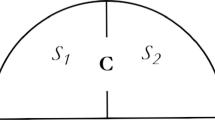Abstract
A study is made of the use of axiomatic methods in theories of social phenomena.
Similar content being viewed by others
References
P. Anand,Axioms for Rational Choice: Towards Philosophy of Mathematical Economics (Oxford University Press), in preparation.
P. Anand, Are the preference axioms really rational?, Theory and Decision 23(1987)189–214.
P. Anand, How to be right without being rational (the von Neumann and Morgenstern way), Oxford Agrarian Studies 11(1982)158–172.
K.J. Arrow, Risk perception in psychology and economics, Economic Inquiry 20(1982)1–9.
K.J. Arrow,Essays in the Theory of Risk Bearing, (Markham, Chicago, 1971).
K.J. Arrow, Alternative approaches to the theory of choice in risk-taking situations, Econometrica 19(1951)404–437.
R. Bausor, The limits of rationality, Social Concept 2(1985)66–83.
M.O.L. Bacharach, Rational preferences and the agent's descriptions, Mimeo, Christ Church College, Oxford (1986).
M.O.L. Bacharach, Commodities language and desire, J. Phil., to appear.
J. Broome, Rationality and the sure-thing pmciple, Discussion Paper, University of Bristol, U.K. (1984).
D. Davidson,Essays on Actions and Events (Clarendon, Oxford, 1980).
G. Debreu,Theory of Value (Wiley, New York, 1959).
J. Dreze, Axiomatic theories of choice, cardinal utility and subjective probability, in:Allocation Under Uncertainty (MacMillan, London, 1974).
G. Frege,Grundgesetze der Arithmetik, Vols. 1 and 2 (Jena, 1893).
W. Gaertner, P.K. Pattanaik and K. Suzumura, Individual rights revisited, Mimeo, Department of Economics, University of Birmingham, U.K. (1988).
J. Harsanyi, Cardinal welfare, individualistic ethics and interpersonal comparisons of utility, J. Political Economy 63(1955)309–321.
E. Hirsch, Rules for a good language, J. Phil. 85, 12(1988)694–717.
R.C. Jeffrey,The Logic of Decision (McGraw-Hill, New York, 1965).
D. Kelsey, The role of information in social welfare judgements, Oxford Economic Papers 39(1987)301–317.
I. LaValle,Decisions in Organisations (Kluwer, 1989), to be published.
E.J. Lemmon,Beginning Logic (Nelson, Walton-on-Thames, 1965).
M. Machina, Dynamic consistency and non-expected utility models of choice under uncertainty, Department of Economics, University of California, La Jolla, CA (1988).
M. Machina, The economic theory of individual behavior toward risk, Institute of Mathematical Studies in Social Sciences, Stanford University (1983).
E.F. McClennen, Sure-thing doubts, in:Foundations of Utility and Risk Theory with Applications, ed. B.P. Stigum and F. Wenstop (Reidel, Dordrecht, 1983).
J.F. Nash, The bargaining problem, Econometrica 18(1950)155–162.
J. von Neumann and O. Morgenstern,Theory of Games and Economic Behavior (Princeton University Press, Princeton, 1944).
F.P. Ramsey,The Foundations of Mathematics and Other Logical Essays (Kegan Paul, London, 1931).
L.J. Savage,The Foundations of Statistics (Dover, New York, 1954).
F. Schick, Under which desriptions? in:Utilitarianism and Beyond, ed. A.K. Sen and B. Williams (Cambridge University Press, Cambridge, 1982).
A.K. Sen,On Ethics and Economics (Blackwell, Oxford, 1987).
A.K. Sen, Rationality and uncertainty, Theory and Decision 18(1985)109–127.
A.K. Sen, Personal utilities and public judgements, Economic J. 89(1979)537–558.
A.K. Sen, Poverty, Econometrica 44(1976)219–231.
H.S. Shin, Counterfactuals and a theory of equilibrium in games, Mimeo, Magdelen College, Oxford (1989).
R. Sugden, Why be consistent? Economica 52(1985)167–184.
A. Tversky, A critique of expected utility theory, Erkenntnis 9(1975)163–173.
G.H. von Wright,The Logic of Preference (Edinburgh University Press, Ebinburgh, 1963).
E. Zermelo, Uber eine Anwendung der Mengenlehre auf die Theorie des Schachspiels, in:Proc. 5th Int. Congress of Mathematicians, Vol. 2 (Cambridge, 1912) pp. 501–510.
E. Zemelo, Untersuchungen über die Grundlagen der Mengenlehre: 1, Math. Annalen 65(1908)261–281.
Author information
Authors and Affiliations
Rights and permissions
About this article
Cite this article
Anand, P. Interpreting axiomatic (decision) theory. Ann Oper Res 23, 91–101 (1990). https://doi.org/10.1007/BF02204840
Issue Date:
DOI: https://doi.org/10.1007/BF02204840




